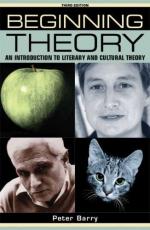
|
| Name: _________________________ | Period: ___________________ |
This quiz consists of 5 multiple choice and 5 short answer questions through Lesbian/gay criticism.
Multiple Choice Questions
1. I.A. Richards pioneered the technique called ________ which was also the title of his book in 1929.
(a) Reception Theory.
(b) Allegorical Interpretation.
(c) Sociological Criticism.
(d) Practical Criticism.
2. Lesbian theory that broke away from feminism and made new allegiances, in particular, with gay men rather than with other women is called "queer theory" or ________.
(a) Heterosexual examinations.
(b) Queer studies.
(c) Homosexual concepts.
(d) Homosexual education.
3. Author Peter Barry informs the reader that the feminist literary criticism of today was the direct product of the "women's movement" of the ________.
(a) 1930s.
(b) 1960s.
(c) 1980s.
(d) 1910s.
4. In Julia Kristeva's essay "The System and the Speaking Subject," the ________ aspect is associated with authority, order, fathers, repression, and control.
(a) Semiotic.
(b) Natural.
(c) Symbolic.
(d) Imaginary.
5. Whom does Peter Barry credit with the suggestion that language used is gendered, so that when a woman turns to novel writing she finds that there is "no common sentence ready for her use"?
(a) Margaret Atwood.
(b) Willa Cather.
(c) Virginia Woolf.
(d) Evelyn Waugh.
Short Answer Questions
1. The narrator states that the study of English literature was seen as a kind of substitute for ________.
2. Who does the narrator say was the founder of a method of studying English which is still the norm today?
3. The chapter titled "Postmodernism" states the term "postmodernism" was used in the 1930s, but its current sense and vogue can be said to have begun with ________'s "The Postmodern Condition: A Report on Knowledge."
4. What term does the narrator explain was a popular term in deconstructive criticism and literally means an impasse?
5. In the chapter titled Post-Structuralism and Deconstruction, whose famous remark on philosophy was, "There are no facts, only interpretations"?
|
This section contains 301 words (approx. 2 pages at 300 words per page) |

|




